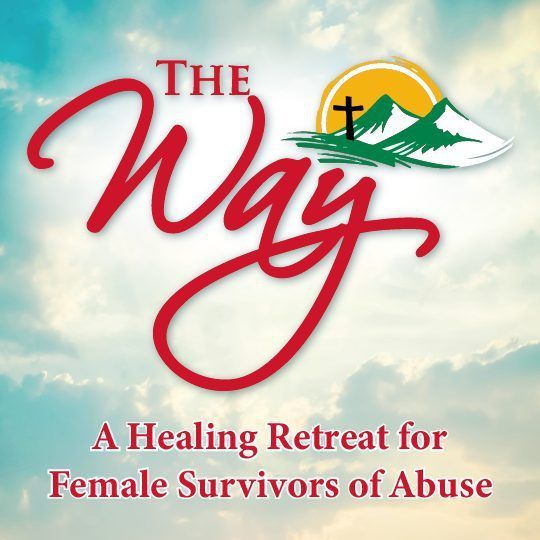
Holy Family Counseling Center therapist, Irene Rowland, LPC will be supporting The Way Retreat
with Sue Stubbs, MS, NCC
Holy Family Counseling Center therapist, Irene Rowland, LPC will be supporting Retreat Leader, Sue Stubbs, MS, NCC, Director of Victim Assistance with the Archdiocese of Atlanta at The Way Retreat.
A 3-day guided meditation and prayer program for women whose abuse by another has deeply affected their heart, mind, body and soul.
What is The Way Retreat all about?
Have you experienced or are you experiencing dread, confusion, deep hurt, betrayal or anger when you think of the abuse you have suffered? Or maybe you are feeling nothing at all. You have every right to these feelings…they are natural reactions to the trauma you have survived.
You may be asking yourself:
What do I do with all of this?
How will confronting my abuse experience affect my life?
How will I ever recover my trust in people, God, my Church again?
Does it really matter?
Do I matter?
The Way is the path to take to find answers to these and many other questions for which your heart, mind, body, and soul have been searching. This is where your healing journey begins. These three days of guided meditations and prayer crafted around the Stations of the Cross will show you the steps Christ took to overcome dread, confusion, deep hurt, betrayal and anger not only for his experience of abuse – which culminated in his death on the cross and new life in the Resurrection – but for your abuse as well. You can choose to walk The Way with him, learn his ways, transform your pain and suffering into a new life, the life God has always wanted for you but that the sins of another has disfigured in countless ways.
You do matter… to God, to your Church, to your loved ones, to the world.
Let Christ show you The Way to peace in heart, mind, body and soul. Take your first voluntary steps on The Way to new life.
This retreat is Christian based. Women of all faiths and traditions are invited and welcomed.
Weekend Overview
The retreat is formatted around the 15 Stations of the Cross. Most have been broken into groupings of three or four stations each. For each grouping there will be:
An Introduction including clips from The Passion of the Christ and a guided meditation which will parallel the abuse Christ suffered on The Way to the abuse you survived.
Then you will move into a Work time where you take what has been shared and engage in a creative activity to express your response to those stations – getting what is going on inside of you on the outside of you. You will choose to either paint, draw, write, sculpt, collage, journal, etc.
Then you will move into a Prayer time where you take all you have done with these stations and talk with Christ about them. This is where the most powerful part of your retreat experience will take pla
Scattered throughout the weekend in between the groupings of the Stations of the Cross, there will also be Conferences that are psycho-educational or personal experience sharing by the Retreat Team on these topics:
- God’s Original Plan for You
- Abused 101
- The Experience of Prayer
- The Sacraments and Healing
- Continued Healing
Throughout the weekend will also be opportunities for one-on-one time with a therapist, Spiritual Direction, Reconciliation, Mass, Adoration of the Blessed Sacrament, Rosary, and the Sacrament of Healing.
About the retreat leader who will be presenting
Your Retreat Leader is Sue Stubbs MS, NCC. Sue has a Masters in Community Counseling from Georgia State University (1993); she is a Nationally Certified Counselor with over 14 years treating survivors of abuse – sexual, physical, emotional, and spiritual. She is currently Director of the Victim Assistance Program in the Office of Child and Youth Protection for the Archdiocese of Atlanta. Sue went in search of an existing retreat experience that would meet the unique needs of the victims/survivors she had met in her role as Victim Assistance Coordinator. She found many excellent programs but they were not quite suited to what the Archdiocese of Atlanta was looking for in providing healing for individuals who had experienced abuse. Thus, Sue set out to create one. Through much prayer and openness to the Holy Spirit, The Way is the result. “Writing this retreat was one of the most rewarding endeavors I have ever undertaken; only topped by actually giving the retreat and seeing the healing work of the Spirit move throughout the weekend.”
The retreat team consists of professional counselors in private practice in the Archdiocese of Atlanta and a priest of the Archdiocese of Atlanta. The team is experienced working with survivors of abuse and well-formed and grounded in the Truth of the Catholic faith.
Holy Family Counseling Center counselor, Irene Rowland, LPC, will be one of the counselors providing support at the retreat. Irene is a licensed professional counselor. She hopes to make the grief journey for others a little easier.
Event Details
Mark your calendars for this enlightening event.
Here are the details you need to know:
Date: September 26-28, 2025
Time: The program starts on Friday at 3 pm and ends on Sunday at 3 pm.
Location: Carmel Retreat Center, 415 Old Collins Road, Hoschton, GA 30548
Cost: $350, Includes private room, program materials, and meals. Scholarships are available upon request.
Space is limited to 15 participants per retreat.
How to Register
Contact Sue Stubbs for an application at 404-920-7554 or sstubbs@archatl.com.
You can also visit their website.
Application deadline 9/15/25.






